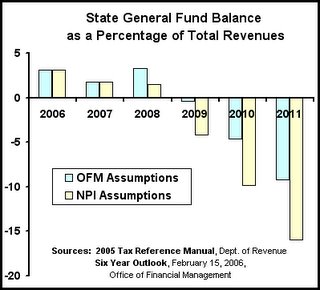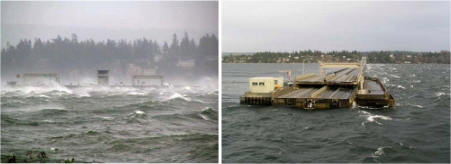Initiative Status Report (February 28th, 2006)

On the Radar Screen
Initiative 917
Sponsor: Tim Eyman and his cohorts Mike and Jack Fagan
Filed: January 9th, 2006
Ballot Title: This measure would cap motor vehicle registration charges at $30 per year, repeal taxes and fees exceeding the $30 limit, calculate vehicle taxes and fees based on purchase price, and retire certain bonds. Should this measure be enacted into law?
Concerned With: Gutting about $2.5 billion in statewide transportation revenues, including critical funding for everything from Amtrak Cascades to highway safety. Repeals most of the money in the 2005 Transportation Package that was not threatened by Initiative 912.
Opposition: Permanent Defense
Additional Note: Paid petitioners have been observed collecting signatures for I-917 at several major retail outlets and urban centers in Western Washington. If you're asked to sign I-917, please decline.
Initiative 920
Sponsor: Dennis Falk (working with a small gang of anti-tax zealots)
Filed: January 9th, 2006
Ballot Title: This measure would repeal Washington’s state laws imposing tax, currently dedicated for the education legacy trust fund, on transfers of estates of persons dying on or after the effective date of this measure. Should this measure be enacted into law?
Concerned With: Wiping out Washington State's estate tax, which is currently dedicated towards public education. The estate tax was restored by legislators and Gov. Gregoire last spring after the previous version of it was struck down by the state Supreme Court.
Opposition: Washington Defense
Initiative 924
Sponsor: Brian Janssen
Filed: January 10th, 2006
Ballot Title: This measure would require, beginning with the 2007-2008 school year, that school districts spend at least 65% of “operational expenditures” on “classroom instructional expenditures,” as defined by the initiative, with certain waivers available. Should this measure be enacted into law?
Concerned With: A foolish proposal to direct how revenues collected for public education should be spent (with the belief that this iwll improve education). The idea has been derided already by several editorial boards and harshly denounced by the Washington Education Association (WEA).
Opposition: WEA
Initiative 933
Sponsor: Dan Wood (on behalf of the WA State Farm Bureau)
Filed: January 26th, 2005
Ballot Title: This measure would require compensation when any government regulation damages the use or value of private property, forbid regulations that prohibit existing legal uses of private property, and provide for exceptions and conditions. Should this measure be enacted into law? (Learn more about this ballot title in this post from David Goldstein at HorsesAss)
Concerned With: Rolling back the state's landmark growth management laws, creating loopholes for developers to exploit, making it more difficult for communities across the state to manage land use.
Opposition: Community Protection Coalition, Permanent Defense
UPDATE: We've received word that coalitions are being organized to fight both Initiatives 920 and 924. There is likely to be a lot of overlap since they both negatively affect public education. The right wingers are awfully busy this year, but we're going to mount a vigorous defense to protect our collective quality of life in Washington State.
Since the right wing controls neither chamber of the Legislature nor the Governor's mansion, their only real outlet for changing public policy is the initiative and referendum process. And they won't hesitate to hijack it and use it to try and slow down or thwart the progress that Olympia is making in tackling our state's toughest problems (transportation, equality, funding education, etc.)
Mounting a vigorous defense this year and defeating this assortment of right wing initiative efforts is critical if we want to move forward. In addition, we can go on offense with at least one proposal by supporting the Energy Security Initiative.








